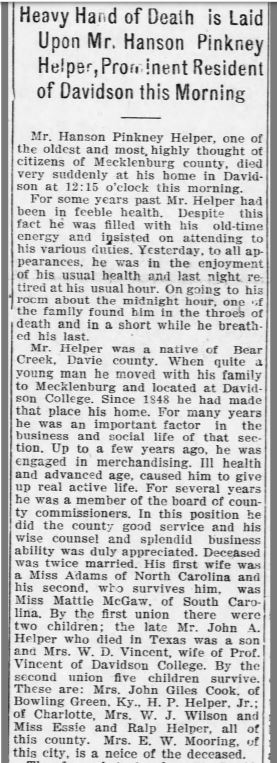In Fall 2019, Archives, Special Collections, & Community (ASCC) had the privilege of working with Dr. Rose Stremlau’s “HIS 306: Women and Gender in U.S. History to 1870” course. Over the course of a semester, students researched the history of women and gender in the greater Davidson, North Carolina area using materials in the Davidson College Archives and other local organizations. The following series of blog posts highlights aspects of their research process.
I am a senior Biology major and Hispanic Studies minor from Swarthmore, Pennsylvania. While enrolled in HIS 306, Women and Gender in U.S. History to 1870, I was interested in investigating the role of women in the town of Davidson as well as the college.
Women’s history has been left out of the majority of historical narratives for all of time, and the history of the town of Davidson is no exception. However, by reading between the lines of available historical resources with the lens of a women’s historian, these gaps can start to be filled in. The records in the Davidson College Archives can be a tool for filling in those gaps, and proved to be useful when researching Hanson Pinkney Helper and his family.
The Helper family owned both the general store and the hotel in Davidson beginning in the mid-1800s. Their family was one of great influence at the time, but most of the documents in the Helper files only mention H.P. Helper and his multitude of roles in the town. Helper’s obituary is one of the only documents that explicitly mentions the women in his family: his two wives and three daughters.1 Being part of a prominent family in the town, it is unlikely these women had no roles in the town as many records would suggest. Closer examination of H.P. Helper’s obituary shows that of his surviving children, his daughters are the only ones who remained in the town of Davidson.2 It is probable these daughters contributed to running the multitude of Helper businesses in the town.

H.P. Helper’s obituary mentions his daughters, Mrs. W.D. Vincent, the wife of a Davidson College professor, and Mrs. M.J. Wilson and Miss Essie Helper who all lived in Mecklenburg County. His sons seem to have moved away to Texas and Kentucky, with only one remaining nearby in Charlotte. At this time, stores and hotels were mostly run with multiple family members helping out to make the businesses run smoothly. The Helper businesses were likely no exception, and the obituary says only the daughters remained in the town. Thus, the obituary provides interesting information in that while the sons have moved away from Davidson, the daughters were still around to help their father with his prominent business operations in the town.
Although credit for women’s crucial roles in running businesses would never be explicitly given in this time period, a woman was most likely the hotelkeeper of the Helper Hotel.3 It was commonly understood in this time period that men owned the hotels, but the work inside of them was mostly domestic and therefore work for women.4 The Helper family was likely no exception with H.P. Helper owning the hotel and his wives and daughters performing the majority of the labor to keep the hotel running. History often excludes these women from the record, but reading between the lines of the archives makes these women’s roles difficult to deny.
Bibliography:
Obituary for H.P. Helper. Charlotte News, October 2, 1902.
Gamber, Wendy. “Tarnished Labor: The Home, the Market, and the Boardinghouse in Antebellum America.” Journal of the Early Republic 22, no. 2 (2002): 177. https://doi.org/10.2307/3125179.

Speak Your Mind